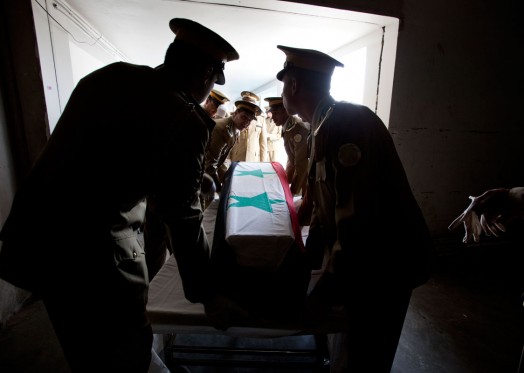A day in Damascus

The day started with a funeral, of course. Every day in Damascus starts with a multiple funeral at the cavernous Tishreen military Hospital in the outskirts of the city. This morning the honor guard and the band gave farewell to seven martyrs and paid respect to 58 years old Brigadier General Ghassan Khalil Abu al-Dhahab, instantly killed in front of his house in Rukn ed-Din: someone had placed a bomb under his car. Stacks of empty caskets sit waiting in the yard under a merciless sun: the weekly toll in just this hospital has soared to 105 dead. Then there are the wounded, and the severely wounded, and the amputees recovering in the twilight of the wards. These are numbers of a civil war, although nobody will dare to mutter the dirty words.
At mid-morning news come in: the pilot of a Mig-21, Col. Hassan Mirei al-Hamadeh, defected to Jordan with his plane and was granted political asylum (it’s the first defection involving the Air Force); more than 20 people are reported killed in the suburbs of the capital; the ICRC is unable to evacuate trapped civilians in Homs where fighting is raging since two weeks; opposition sources say 90 people have been killed across the country. UN observers at their headquarter at the Dama Rose Hotel won’t resume their inspections for now: too dangerous, they say; too useless their mission, and doomed, I say.
At 2 p.m. I am in Qudsaya, 10 km. down the road to Lebanon. Most of the place is controlled by the army, but in the last couple of days it was showered by rockets&bullets and some houses have been hastily abandoned. I talk with young soldiers ready to die for Bashar. Then in the market square I am presented with mortar shells and one angry man shouts “Talk well of Assad and we’ll fuck you!”
Mohammed the driver starts the engine and I know it’s time to leave quickly. Back to Damascus, where it’s still safer. But for how long? Day after day the bloodshed seems to inch closer to the heart of the country.





